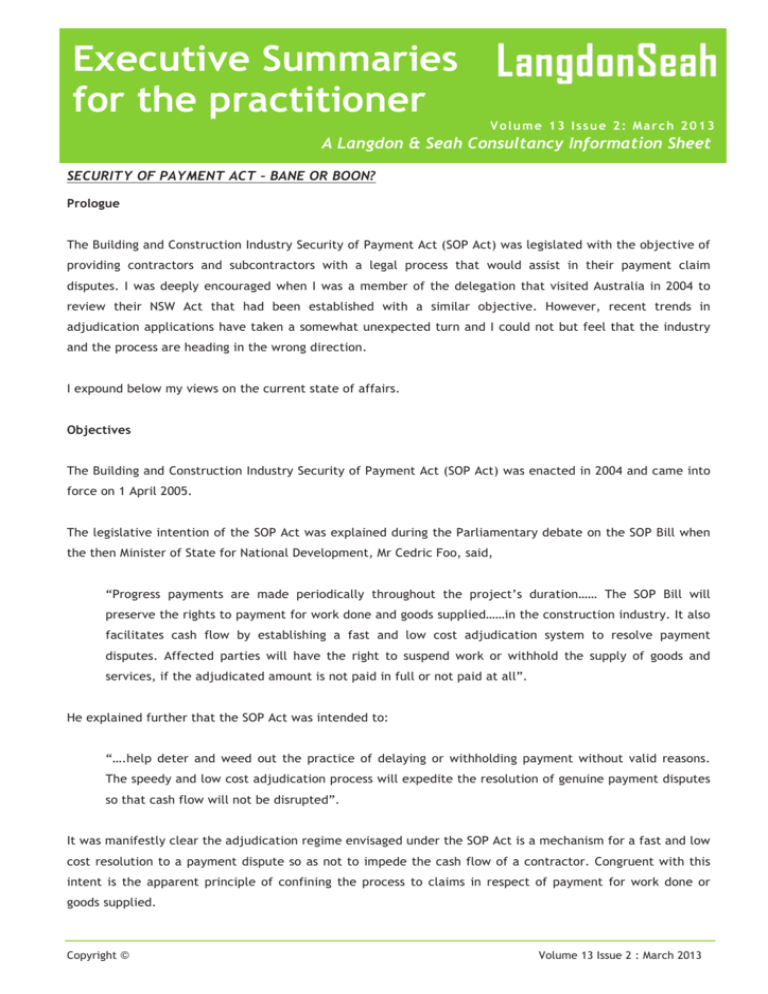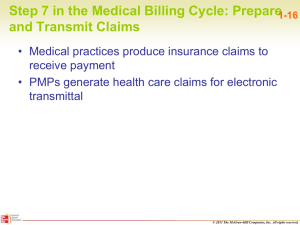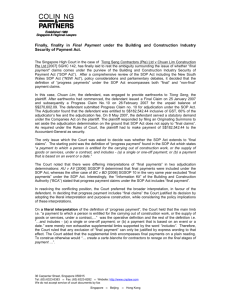
Executive Summaries
for the practitioner
Volume 13 Issue 2: March 2013
A Langdon & Seah Consultancy Information Sheet
SECURITY OF PAYMENT ACT – BANE OR BOON?
Prologue
The Building and Construction Industry Security of Payment Act (SOP Act) was legislated with the objective of
providing contractors and subcontractors with a legal process that would assist in their payment claim
disputes. I was deeply encouraged when I was a member of the delegation that visited Australia in 2004 to
review their NSW Act that had been established with a similar objective. However, recent trends in
adjudication applications have taken a somewhat unexpected turn and I could not but feel that the industry
and the process are heading in the wrong direction.
I expound below my views on the current state of affairs.
Objectives
The Building and Construction Industry Security of Payment Act (SOP Act) was enacted in 2004 and came into
force on 1 April 2005.
The legislative intention of the SOP Act was explained during the Parliamentary debate on the SOP Bill when
the then Minister of State for National Development, Mr Cedric Foo, said,
“Progress payments are made periodically throughout the project’s duration…… The SOP Bill will
preserve the rights to payment for work done and goods supplied……in the construction industry. It also
facilitates cash flow by establishing a fast and low cost adjudication system to resolve payment
disputes. Affected parties will have the right to suspend work or withhold the supply of goods and
services, if the adjudicated amount is not paid in full or not paid at all”.
He explained further that the SOP Act was intended to:
“….help deter and weed out the practice of delaying or withholding payment without valid reasons.
The speedy and low cost adjudication process will expedite the resolution of genuine payment disputes
so that cash flow will not be disrupted”.
It was manifestly clear the adjudication regime envisaged under the SOP Act is a mechanism for a fast and low
cost resolution to a payment dispute so as not to impede the cash flow of a contractor. Congruent with this
intent is the apparent principle of confining the process to claims in respect of payment for work done or
goods supplied.
Copyright ©
Volume 13 Issue 2 : March 2013
…@Langdon & Seah Consultancy Executive Summaries for the Practitioner
Page 2
SECURITY OF PAYMENT ACT – BANE OR BOON?
The Act was enacted essentially to protect contractors and subcontractors whose payments were unjustifiably
withheld by owners or main contractors. Cash-flow is the mainstay and sustenance of main contractors and
subcontractors and if payments due to them are unreasonably withheld it would inevitably result in their
bankruptcy and in turn the collapse of the entire chain of subcontractors and suppliers. Ultimately not only
will the owners suffer but also the entire construction industry.
Current State of Affairs
Since the enactment, the objectives of the Act seemed to be fulfilled with adjudication determinations duly
made by adjudicators in favour of oppressed claimants along with the fair share of adjudication reviews and
applications to the Court to set aside determinations by dissatisfied respondents. However, with the passage
of time, there has been a noticeable shift in the emphasis of the adjudication applications and the manner in
which they are filed.
Festive Holidays
Quite often, adjudication applications are filed just before the start of a long holiday period when offices are
usually closed and staff involved in a project would be on leave.
The SOP Act has duly prescribed the procedure under which payment claims and responses are to be filed by
parties. However, there are no provisions in respect of the procedure during festive periods.
While it is conceded that a claimant is legitimately entitled under the Act to submit an adjudication
application at any time he deems fit, it is indeed an impediment if not a disadvantage to the respondent if
the latter’s office is closed and the person in charge is unavailable. The closure of the adjudicator’s office
during the period would also compound the difficulty in ensuring the timelines stipulated in the Act are met.
In view of the relatively harrowing circumstances during such periods, changes to the provisions of the Act
would be extremely helpful in providing the adjudicator and the respondent some latitude and peace of mind
in adhering to timelines.
Claims for Loss and Expense
It is arguable as to whether claims for loss and expense fall within the ambit of the SOP regime considering
the principle that claims under the Act are in respect of payment for work done or goods supplied. On the
other hand, loss and expense could be treated as being arising from or related to work done and therefore
would fall within the adjudication process.
Copyright ©
Volume 13 Issue 2 : March 2013
…@Langdon & Seah Consultancy Executive Summaries for the Practitioner
Page 3
SECURITY OF PAYMENT ACT – BANE OR BOON?
Nevertheless, the inclusion of claims for loss and expenses and prolongation costs in adjudication applications
has now become a fairly common phenomenon. This has undoubtedly introduced a new dimension to the
adjudication regime. Sometimes these claims are included as a tactical or even an exploitative move by the
claimant and, even where this is apparently the case, the respondent still has to deal with and address such
claims.
Under normal circumstances and without time inhibitions imposed by the SOP Act, the assessment of loss and
expense claims is already a laborious and complex task. It has never been a straightforward task for
consultants. This is borne out by contract provisions that allow the contract administrator up to the final
account stage to evaluate such claims. It entails the verifications of detailed documents and evidences in
addition to the consideration of whether such claims are contractually valid. Clearly, time and expertise are
needed to resolve such claims.
The inclusion of such claims in adjudication applications coupled with innumerable ring files of documents
have certainly changed the entire character and redefined the realm of the SOP Act. While the deadline for
making a determination could be easily extended by mutual consent from both parties, it begs the question as
to whether the intent of the Act for a fast and low cost resolution process has been abrogated by the
adjudicator asking for a time extension to make a determination.
Final Account Matters
It is trite law that the SOP Act applies equally to both progress payment and final payment claims.
Finalisation of accounts is again a time-consuming task. It includes variation orders and a multitude of claims
including of course time extensions and prolongation costs.
On most projects, issues of delay by contractors inevitably arise but very often they are not penalised or
imposed with liquidated damages. With the advent of the SOP Act the intention was certainly not to
disadvantage the owners in this respect as the contract provisions still allow them to make deductions where
necessary from the progress payments. But again claims for time extensions and related prolongation costs
are never straightforward issues.
In the normal course of events, a payment response will need to have reasons stated for either not paying or
withholding payments in respect of variations and other claims. The reasons to be stated need not be
extensive as long they are clear. However, when the whole gamut of final account claims are submitted for
adjudication, they assume a totally different disposition and complexity, not least the large number of files
required for the adjudication response. It will surely result in a byzantine adjudication process that is
definitely neither fast nor low cost. It will be foolhardy for anyone to claim otherwise.
Copyright ©
Volume 13 Issue 2 : March 2013
…@Langdon & Seah Consultancy Executive Summaries for the Practitioner
Page 4
SECURITY OF PAYMENT ACT – BANE OR BOON?
Adjudication
The inclusion of complex issues like loss and expense claims and other matters that are normally dealt with as
part of finalisation of accounts in adjudications have dramatically changed the legal landscape of
adjudication. It requires adjudicators who can see through the sophistry in the arguments used by Parties to
advance their cases on very technical grounds and this is exacerbated when a full analysis of a matter is
prevented by the rigid timelines.
Some of these issues are more apposite for arbitrations by virtue of the complex nature of such claims. The 14
day period mandated under the Act for adjudicators to make a determination was clearly meant to support
the fast and low cost principle. Considering that arbitration had long been in existence and well established to
deal with complex matters like loss and expense claims and settlement of variation orders it seems sensible
on policy grounds to leave these complicated claims with arbitrators rather than adjudicators. While the
extent of documents required by the Act is not expressly provided, the short time frame of 14 days suggests
that claims should not be voluminous or complicated. Adjudication determinations merely provide an interim
finality and parties are free thereafter to submit to arbitration or litigation to recover their rightful claims
albeit this will incur another set of legal fees.
No doubt we might question as to whether this is the direction we want to take and whether such lengthy
adjudication process aligns with the productivity gain the industry is trying its utmost to achieve. In fact, it
would seem that the SOP regime of the SOP Act is developing in a direction quite unexpected in Parliament in
that, as drafted, several of its unduly complicated provisions fester a highly technical approach to
adjudication which does not serve the industry well. There is a case to review and simplify the provisions and
processes.
While we lament the unwarranted shift in emphasis we need to face up to reality and to accept that
adjudications are now much more complex than envisaged under the Act. By virtue of the complexity, it now
entails an informed and enlightened approach to adjudications with the consequential need for adjudicators
to be properly trained and equipped, and conversant not only in legal principles but on technical and
construction issues. While some adjudicators come from the ranks of architects, engineers and quantity
surveyors, not all of them are legally trained. It is therefore important that they keep themselves abreast
with contractual issues like delay and time extensions and matters that impinge on payments and related
claims.
The fact that adjudication determinations are synonymous with interim finality does not derogate from the
responsibility of adjudicators to rule fairly and properly and with sound and rational basis. This is more so for
complex issues like loss and expense claims and matters related to final accounts such as variations and time
extensions.
Copyright ©
Volume 13 Issue 2 : March 2013
…@Langdon & Seah Consultancy Executive Summaries for the Practitioner
Page 5
SECURITY OF PAYMENT ACT – BANE OR BOON?
The dispensing of justice and the cardinal principle of making a fair and proper determination apply equally to
both adjudication and arbitration. However in adjudications, oral statements made by a witness are not under
oath unlike arbitrations, and in this respect, the truth or otherwise of oral assertions need to be carefully and
assiduously considered by adjudicators. This is one reason for detractors to argue against the inclusion of
claims for complex issues in adjudication.
Conclusion
The intent of the SOP Act in having a fast and low cost resolution process so as not to impede the cash flow of
contractors or subcontractors that would otherwise result in massive bankruptcies is not disputed. However,
we must now look critically at the recent trend of adjudication applications and ask ourselves whether
adjudications that involve complex contractual issues with innumerable volumes of ring files and hearings that
last for a week or more with resultant high legal fees was what Parliament intended when the Bill was first
read, and whether such long adjudication hearings are the correct approach to resolve payment disputes
between parties; or whether other alternative dispute resolution processes like expert determination under
the SIA form of contract would produce the same desired effect but with a more expeditious and less costly
process.
It bears mentioning that parties to a contract must strive to discharge their duties fairly and in accordance
with the contract provisions and in this regard contract administrators must diligently and equitably
administer a contract. If both parties act responsibly and professionally, then adjudications would never come
into the picture.
Adjudicators have no choice but to deal with any loss and expense claims and final account matters that are
presented before him, but they must be judicious and to allow only claims that have merit and are warranted
notwithstanding the interim nature of their determinations.
While the SOP Act was meant to protect the subjugated and preyed contractors and subcontractors, it must
not degenerate into a situation where the prey now becomes the predator.
SEAH CHOO MENG
Langdon & Seah
Copyright ©
Volume 13 Issue 2 : March 2013
…@Langdon & Seah Consultancy Executive Summaries for the Practitioner
Page 6
SECURITY OF PAYMENT ACT – BANE OR BOON?
L&S TPI is a measure of the comparative tender price movements based on the projects handled by Langdon & Seah Singapore Pte Ltd.
The TPI reflects the tender price level of contracts let out over the years. Other than material and labour costs, it takes into account the
elements of competition, risk and profits.
155
150.0
150
L&S
BCA*
Tender Price Index (Base Year at 2005)
145
140
135
131.6
130
137.3
125
120
115
112.9
116.8
115.9
108.0
107.6
100
102.4
107.3
90
98.9
91.8
88.9
85
100.0
95.6
100.2
95
^
123.3
^
123.3
^
^
113.3
110
105
120.9
122.5
90.4
91.2
87.9
88.1
2000
2001
114.2
103.2
100.0
96.9
90.6
114.4 114.1
91.4
89.9
80
1996
1997
1998
1999
2002
2003
2004
2005
2006
2007
2008
2009
2010
2011
2012
Source: * Building and Construction Authority as at 15 February 2013
Note:
With effect from the 1st Quarter of 2009, BCA has implemented the new TPI series with Base Year 2005 = 100. The
TPI chart shown above has been amended accordingly to reflect the Base Year as Year 2005.
^ L&S TPI is based on 4th Quarter index
Langdon & Seah Singapore Pte Ltd (LS) in addition to providing traditional quantity surveying has developed a range of specialist
integrated management services for construction projects comprising of cost management, project management, contract advisory &
dispute management, cost engineering services, loan monitoring, insurance valuations and loss adjusters assessment, sustainable
construction, construction supervision services and investment appraisals.
L&S Contract Advisory & Dispute Management Services Pte Ltd – Eugene Seah / Amos Teo / Kua Moon Yin
Professionally qualified and experienced construction professionals providing the following within Singapore, the Region and the
International arena:
Front End Contract Advisory work including contract administration, procurement strategy, incorporation of conditions of contract
•
Claims Assessment
•
Legal and Litigation Support
•
•
Expert Technical advice and witness
Dispute Management towards avoidance and resolution
•
•
Evaluator, Mediator, Arbitrators and Adjudicator
Research, publication, seminars, short courses and in-house training for staff, clients and consultant organisations
•
L&S
•
•
•
•
Consultancy - Eugene Seah / Amos Teo
Construction Innovation
Sustainability and Green Issue
Bank Technical Advisory Management
Facilities Cost Consultancy Capital Allowance
• Technical Due Diligence
• Market Intelligence and Research
• Management Consultancy / Development
Landgon & Seah Consultancy includes the following services through the following departments:Mechanical & Electrical Quantity Surveying Department :Goh Chok Sin and Lorimer Doig
•
Budget and detailed cost estimating
Tender and Contract documentation
•
Financial management of contract
•
•
Value engineering
Life cycle costing
•
•
Capital allowances taxation assistance
•
Dispute resolution and expert witness reports
•
Cost audit
Contact us at our Email:CADMunit@sg.langdonseah.com; CostResearch@sg.langdonseah.com; M&Eunit@sg.langdonseah.com;
Tel: 65 6222 3888 or Visit our website at www.langdonseah.com
Cost Research Department:–
Eugene Seah, Ho Kong Mo, Cheryl Lum and Christine Chan
•
Cost Analysis & Research of tenders and its price indexing
•
Value Management & Engineering exploring schemes,
architectural forms and constructions methods towards
achieving efficiency and buildability
•
Benchmarking – Generic, Competitive, external and internal
•
Reinstatement Cost Assessment
Due Diligence Reporting
•
…@Langdon & Seah Consultancy’s Executive Summaries for the Practitioner by Eugene Seah Hsiu-Min and Amos Teo provides a synopsis of legal and/or professional practice issues in the
construction industry and is intended for information purposes only. While L&S Consultancy endeavours to ensure the accuracy and completeness of the information sheet, specific
professional legal advice should be obtained and no reliance should be placed on any part of its contents. All rights reserved. Copying in any form or by any means (electronic, photocopying
or otherwise) is strictly prohibited without the written permission of LS Consultancy.
Copyright ©
Volume 13 Issue 2 : March 2013
Printed by Kairos Design




